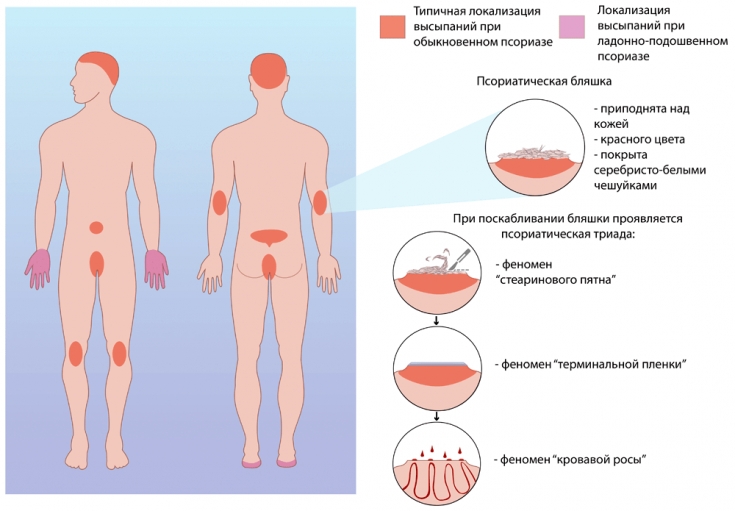Psoriasis – a chronic skin disease in which red spots appear on the body with a scaly, flaky and itchy surface.
Traditional medicine considers psoriasis to be an autoimmune disease, when the body begins to perceive some of its cells as foreign and produces antibodies to fight them. That is, he begins to fight with himself.
And according to experts in the field of psychosomatics, this disease is a reflection of the conflict of self-attitude, the inability of a person to value himself and the presence of derogatory thoughts about himself.
The soul reflected in the skin
Being a bodily shell, the skin reflects a person's thoughts about himself. Try to describe your skin – and you will understand what you really think about yourself. The skin separates, isolates us from the outside world, and it also allows us to make contact with others.

With it we feel gentle touches, rough thrusts, sexual arousal, pain, we express our emotional state – we blush with shame, we turn pale with fear. From birth, with the help of touch, we get a feeling of security, acceptance and love, tenderness, closeness and security.
For the first time we feel the boundaries of our own body with our skin, we realize ourselves as separate from the mother and from the world of the individual. Through the skin, the child feels the emotions and feelings experienced by the mother in relation to him – and due to the lack of other available means, it is with the skin that he reacts to the world around him.
Having left the period of infancy, despite the availability of adult means of expressing feelings, we continue to react with our skin to unconscious intrapsychic conflicts and external psycho-traumatic circumstances.
It is believed that a person with psoriasis rejects himself by exfoliating part of himself in the form of scaly plaques. He is so ashamed of himself that he refuses relationships with others, hiding behind his illness.
He blames himself for the negative emotions and bad deeds he experiences and wants more than anything else to change, literally change his skin.
Psoriasis as a post-trauma
To what extent is it worth relying on this opinion – question is moot. However, the connection between traumatic situations and psoriasis has been experimentally proven. Scientists from the University of Rijeka in Croatia conducted a study of patients suffering from psoriasis and dermatological diseases of a non-psoriatic nature.
In the proposed questionnaire, the subjects described the psychological traumatic experience of the past – sexual, emotional or physical abuse, stress, alcohol and drug addiction, etc.
As a result, it was found that the frequency and intensity of negative life events in patients with psoriasis is much higher than in people suffering from non-psoriatic skin diseases.
Psoriasis treatment: experiences with vitamin D?
Moreover, psychotraumas received at a young age had a stronger effect on the body than later events, and more often entailed the development of skin diseases.
Defeat anxiety? Maybe!
On the other hand, the disease itself causes significant psychological difficulties in patients. People with psoriasis are ashamed of their disease, are disgusted with themselves, and therefore attach excessive importance to the opinions of others about themselves, reject themselves and worry about being offended or hurt. Increased anxiety causes new stress and increases the symptoms of the disease.
Features of the clinical picture, diagnosis and treatment of nail psoriasis?
In order to break the vicious circle of "disease-stress-exacerbation", in the complex therapy of psoriasis, along with medication and physiotherapy, psychotherapy for anxiety disorders is used, which allows the patient to identify and work through internal conflicts, calm down, accept himself and learn to live with the disease .
After all, these patients have to constantly overcome their own complexes regarding skin defects and prove to themselves and others that the disease does not make them worse.
Along with the help of a psychotherapist, the patient needs self-help. Auto-training and maintaining an active lifestyle will help the patient.
Three main modern methods of treating psoriasis?
Hiding from people in anticipation that the aggravation will pass – completely wrong position. The more actively a person manifests himself in life, the stronger the emphasis shifts from his morbid state to the products of his activity – significant and beautiful.
What doesn't kill us makes us stronger. After all, the struggle for recognition of the environment makes psoriasis patients energetic and adaptable to any difficulties.
Psoriasis sufferers include John Rockefeller, Winston Churchill, Henry Ford, Cameron Diaz, Britney Spears and Tina Karol. This is a great illustration of what psoriasis – no reason not to be successful, rich and beautiful.






Add a comment